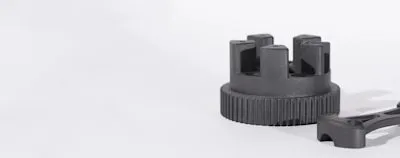Yes, Glass-Filled PA12 is significantly stronger and stiffer than regular PA12 due to the addition of 10–60% glass fibers. These fibers reinforce the polymer matrix, improving tensile strength, rigidity, and dimensional stability.
Used to substitute functional injection moulded parts, good chemical resistance.

Used to substitute functional injection moulded parts, good chemical resistance.

Property Value Mechanical Properties Ultimate tensile strength 30 – 48 MPa Young’s
Property Value Mechanical Properties Ultimate tensile strength 41 – 50 MPa Young’s
Experience precision engineering with XC Machining. From detailed prototypes to high-volume production, we’re here to turn your concepts into reality. Contact us today to discuss your project needs!
Is Glass-Filled PA12 stronger than standard PA12?
Yes, Glass-Filled PA12 is significantly stronger and stiffer than regular PA12 due to the addition of 10–60% glass fibers. These fibers reinforce the polymer matrix, improving tensile strength, rigidity, and dimensional stability.
Does Glass-Filled PA12 absorb moisture like other nylons?
Compared to PA6 or PA66, Glass-Filled PA12 has much lower moisture absorption. This means it maintains dimensional accuracy, consistent mechanical properties, and stable performance even in humid environments. The low moisture uptake is one reason it is widely used in aerospace, automotive, and electronics applications.
Can Glass-Filled PA12 be used for parts exposed to heat or chemicals?
Glass-Filled PA12 performs very well under elevated temperatures and offers excellent resistance to fuels, oils, greases, mild acids, and industrial chemicals. Its reinforcement improves heat deflection temperature and structural strength, making it suitable for automotive engine bay parts, machinery housings, and chemical-contact components.
Is Glass-Filled PA12 suitable for both CNC machining and 3D printing?
Yes, PA12 GF is compatible with both CNC machining and additive manufacturing processes such as MJF and SLS. However, its abrasive nature requires specialized tooling during machining to prevent excessive wear. In 3D printing, PA12 GF provides high stiffness and low warpage.
Does the glass fiber content affect the surface finish?
Glass fibers can influence the surface appearance and feel of PA12 GF parts. Machined parts may exhibit visible fiber texture, while 3D-printed parts have a slightly matte, grainy finish. XC Machining offers several post-processing solutions, such as vapor smoothing, media tumbling, and coating.
Copyright © 2026 XC Machining
Copyright © 2026 XC Machining